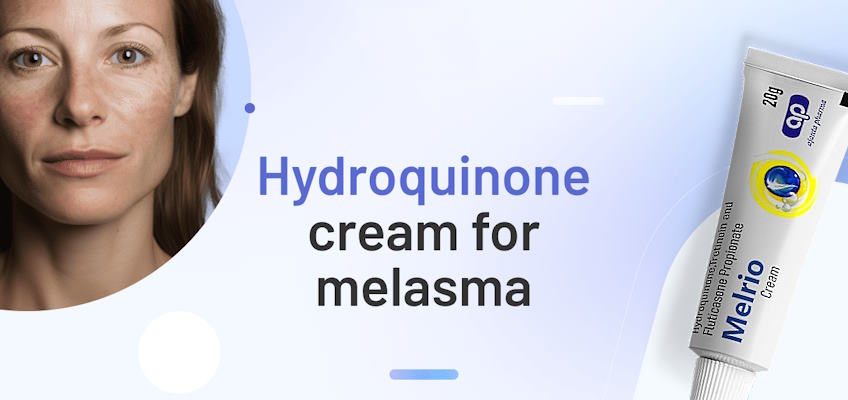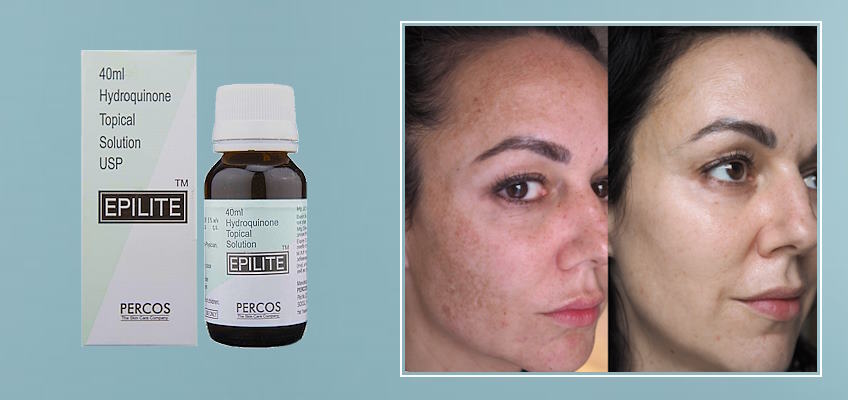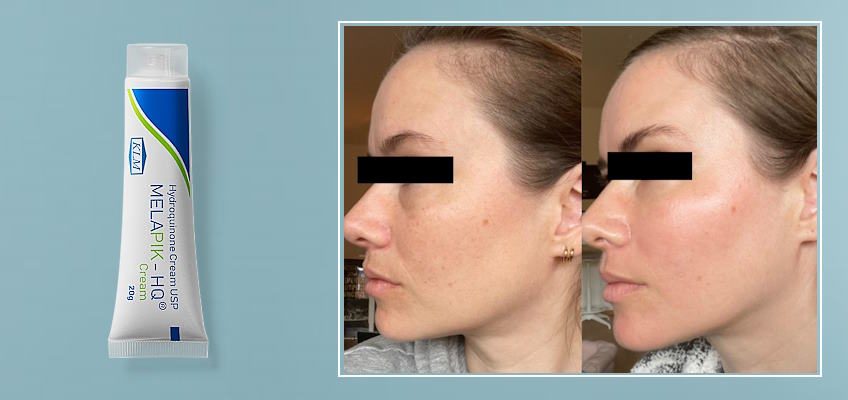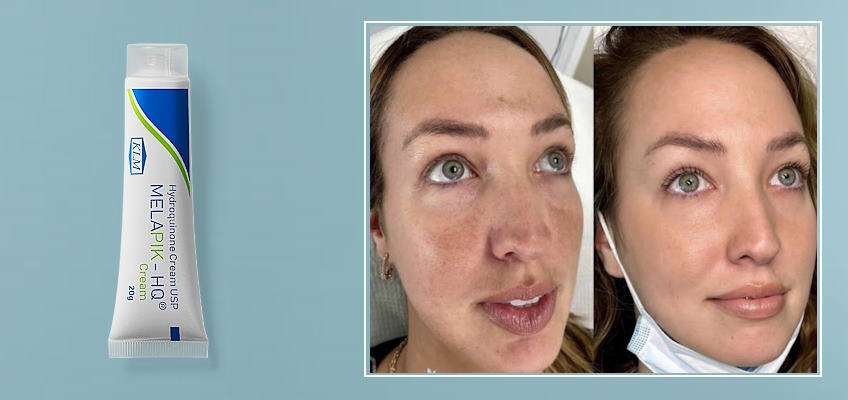What is Hydroquinone Cream? Uses, Precautions, Side Effects
Table of Contents
Recent research by the National Center for Biotechnology Information revealed that Hydroquinone serves as a skin-bleaching agent used to treat various skin conditions, such as melasma, hyperpigmentation, freckles, and age spots. Typically, it is available in cream, emulsion, or gel form and is quite safe for every skin type. However, improper and excessive use of Hydroquinone cream may cause certain skin disorders. Therefore, it is crucial to consult with your skincare expert before applying it to your skin to mitigate any potential risks. So, let’s have a detailed overview of Hydroquinone, its mode of action, associated risk factors, and safety concerns!
What exactly is Hydroquinone?
Hydroquinone is a topical skin-lightening product used to reduce melanin production in the skin. Although it helps in whitening the skin tone, its effects are not permanent. Unprotected exposure to ultraviolet rays from the sun gradually reverses its impact. Additionally, applying hydroquinone to your skin is a non-surgical aesthetic treatment that can be conveniently performed at home to address uneven skin patches and pigmented spots.
How Does Hydroquinone Cream Work on Skin?
Hydroquinone functions by temporarily inhibiting the synthesis of melanocytes in your skin, the cells responsible for producing melanin. An abnormal increase in melanocyte production can lead to hyperpigmentation. Therefore, it is essential to maintain a balanced quantity of this pigment in the skin to prevent excessive pigmentation.
Uses of Hydroquinone Cream to Treat Various Skin Conditions
Hydroquinone is used to address different skin issues, particularly hyperpigmentation. It is also recognized as an effective solution for fading red or brown spots on the skin. It is important to note that hydroquinone is not a permanent solution; instead, it is a short-term treatment, and its effects can revert back within a few weeks or months after stopping its use. Some common benefits of Hydroquinone 4 for the skin include:
Melasma
Uneven skin tone, brown to grey pigments, and dull skin, especially on the cheeks and nose area, are the common signs of melasma. While unprotected sun exposure is the primary cause, certain health conditions and environmental factors also contribute significantly to its appearance.
Hydroquinone’s ability to inhibit melanin production efficiently is the reason that makes it a top priority for dermatologists. Furthermore, it is highly recommended to prevent hyperpigmentation after resurfacing procedures, including laser treatment.
Freckles
Freckles typically develop as dark patches on fair skin tone. This concern can be effectively addressed by applying hydroquinone cream to the affected area. However, there are precautions to consider when using this product.
Firstly, since freckles often appear due to sun exposure and hydroquinone-treated skin becomes sensitive to sunlight. Therefore, it is crucial to wear sunblock with hydroquinone to protect the skin from harmful UV rays.
Secondly, freckles are a hereditary disorder; complete treatment may not be possible. To diminish their appearance, using hydroquinone cream at intervals (with at least a month break between treatments) is the recommended approach.
Acne Scars
Acne has become one of the most prevalent and concerning skin issues today. The deposition of excess oil, dead skin cells, and bacteria in the pores often leads to acne. Usually, these scars fade naturally over time; occasionally, topical procedures are needed to help reduce blemishes.
Hydroquinone, when applied in combination with a mild concentration of retinol, can help in discoloration of acne spots. Moreover, sun protection is essential to achieving the best results along with this treatment.
Moles
Some people consult dermatologists to have their moles removed, but it’s not a preferred solution. Instead of removing a mole, fading its appearance is often a better option, and hydroquinone is the best choice for this. Hydroquinone works by disrupting highly pigmented areas, leading to the discoloration of moles. Additionally, it removes the dead skin cells from moles and sloughs them away, hence becoming lighter in color and unnoticeable.
Eczema and Psoriasis
Eczema, also known as dermatitis, represents inflammatory responses in the skin, characterized by scaly, dry skin and acute rashes on the face, hands, feet, elbows, and knees.
Psoriasis, on the other hand, is an autoimmune disorder that leads to an abnormal increase in the production of new cells, resulting in silvery, dry patches and red, inflamed skin.
The topical application of hydroquinone in combination with tretinoin can effectively reduce the signs of these skin disorders. However, keep in mind that improper and excessive usage, as well as using it without consulting your skincare expert, can worsen the condition.
-
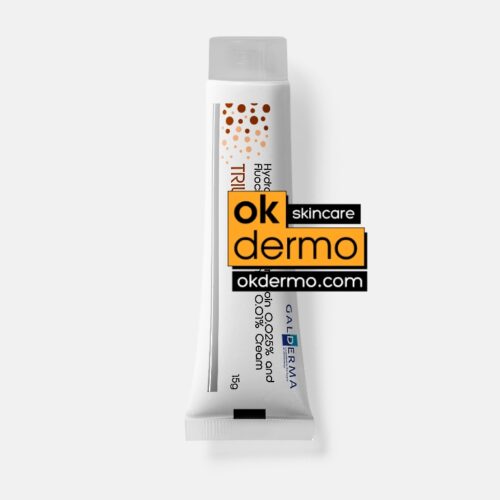
Tri-Luma® Cream for Hyperpigmentation
Hydroquinone 2% / 4% + Tretinoin 0.012% / 0.05% + Fluocinolone 0.01%
Size: 15g / 0.53oz, 20g / 0.7oz
Brand name: Lumiquin, Lumacip Plus, Refaquin, Retrieve
From USD $35.00 Select options -
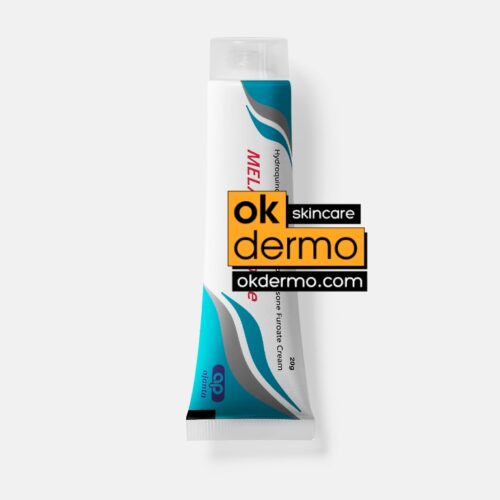
Melacare Forte® Triple Action Cream
Hydroquinone 4% + Tretinoin 0.025% + Mometasone 0.1%
Size: 25g / 0.9oz
USD $24.00 Add to cart -
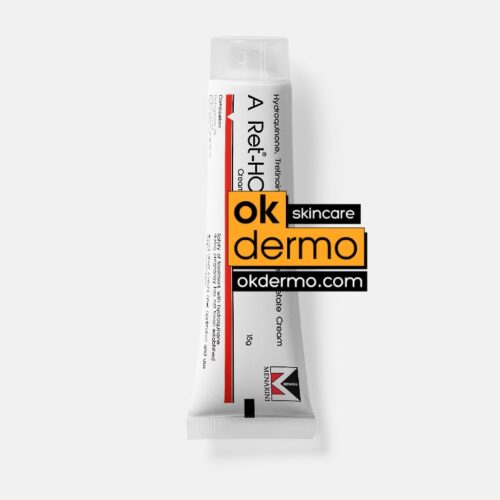
A Ret-HC® / Melanorm-HC® Skin Cream
Hydroquinone 2% + Tretinoin 0.025% / 0.05% + Hydrocortisone Acetate 1%
Size: 15g / 0.53oz
Brand name: Pigmanorm, Katarya, Kataryaxn, Ketarya, Kevarya
From USD $24.00 Select options -
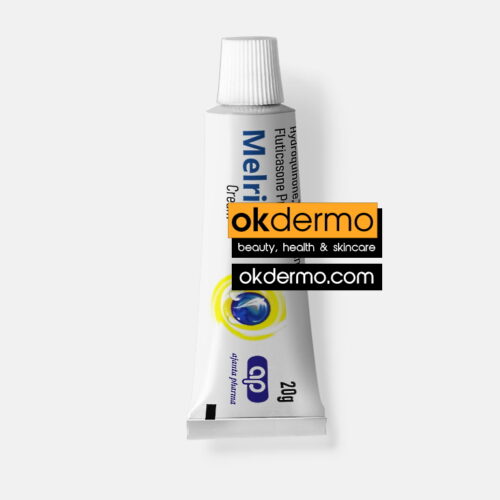
Melrio® Skin Whitening Cream
Hydroquinone 2% + Tretinoin 0.025% + Fluticasone Propionate 0.05%
Size: 20g / 0.7oz
Brand name: Tri-Luma
USD $24.00 Add to cart
How to Use Hydroquinone Cream for Best Results?
Like any other skincare product, the initial step in applying hydroquinone is to ensure that the skin is thoroughly clean. Wash the targeted area with a mild cleanser and pat it dry.
Take a small quantity of hydroquinone and apply it evenly to your skin using a gentle massage. For optimal results, use sunscreen with adequate sun protection along with hydroquinone to protect the skin from the harmful sun rays.
Remember, consistency is the key! So, adding hydroquinone to your regular skincare regimen is essential because irregular application may reverse the effects with time. Another important thing is to follow the guidance of your dermatologist, especially if you have specific skin concerns.
Precautions and Skincare Tips to Use Hydroquinone
Regular application in a proper way contributes to achieving the best results with hydroquinone cream. Here are a few tips to follow for applying hydroquinone cream effectively on the Skin:
- Hydroquinone is specifically formulated to be applied on the outer skin surface. Therefore, make sure to avoid direct contact with eyes, lips, mouth, or nose, as this may cause skin irritation and rash.
- Hydroquinone may be allergic to certain skin types, so doing a patch test is good to check your sensitivity. For this, apply a small quantity of hydroquinone cream on the skin (make sure the area should not be injured or damaged) and wait for at least 12-24 hours to check the reaction of your skin. Don’t use it if you develop itching, severe rash, or blistering.
- When using hydroquinone, sun protection is crucial. Wearing high-quality sunscreen with a good sun protection factor (SPF) can minimize sensitivity concerns. Also, make sure to use sunblock daily, regardless of sunny or cloudy weather, to safeguard your skin effectively from potential sun damage.
- Always massage hydroquinone gently into your skin using circular motions for better absorption. Make sure to avoid hard rubbing your skin as it can result in irritation and redness.
- Never use hydroquinone-containing products excessively or without consulting with your skin expert.
Potential Side Effects and Associated Risks
Similar to other skin products, improper and excessive use of hydroquinone can pose some mild to moderate-level side effects. Moreover, it may not be suitable for people suffering from contact dermatitis, acute sunburn, or certain chronic skin conditions. Following are some potential side effects of hydroquinone:
- Thin skin texture
- Extreme skin dryness, itching and redness
- Allergic reactions, such as trouble breathing, itchy red skin, inflammation, and so on
- Blue-black skin discoloration, especially in black people
- Uneven and patchy skin
- Enhanced Susceptibility to the sun’s ultraviolet rays, causing sunburn
- Prominence of Blood vessels
- Unapproved hydroquinone products may contain mercury, a toxic compound
-
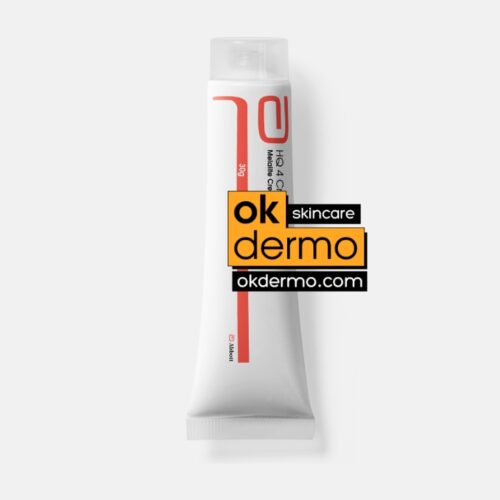
Pure Hydroquinone 4% Skin Whitening Cream
Hydroquinone 4% USP Skin Lightening Agent
Size: 20g / 0.7oz, 30g / 1.05oz
Brand name: Eldoquin, Melanox, Expigment, Eqinon, Melloderm
From USD $25.00 Select options -
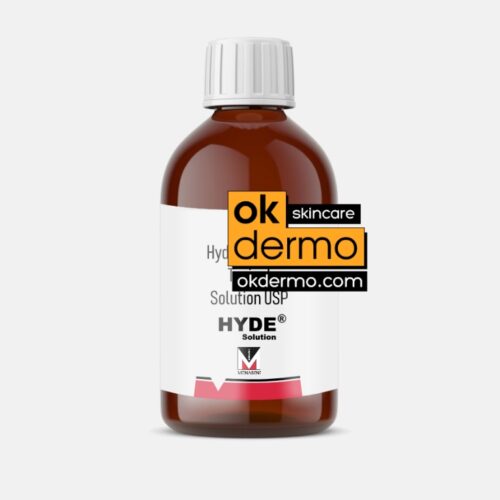
Hydroquinone 5% Topical Lotion
Hydroquinone 5% USP Solution
Brand name: Mediquin, Vitaquin, Interquin
From USD $25.00 Select options -
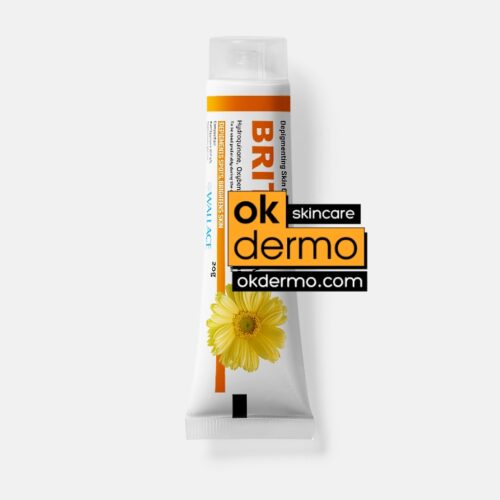
Brite® Skin Whitening Cream
Hydroquinone 4% + Oxybenzone 3% + Octinoxate 5%
Size: 20g / 0.7oz
Brand name: Lustra
USD $24.00 Add to cart -
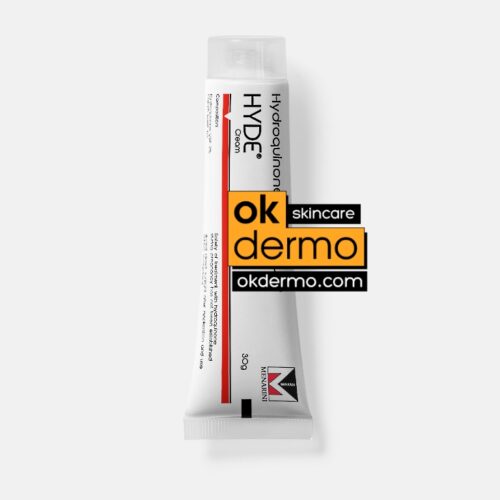
Hydroquinone 3% Topical Cream
3% Hydroquinone USP Skin Lightening Cream
Brand name: Melamix, Esoterica, Alera, Melquin, Melamin, LumaSilk, Obagi, Blanche
From USD $22.00 Select options -
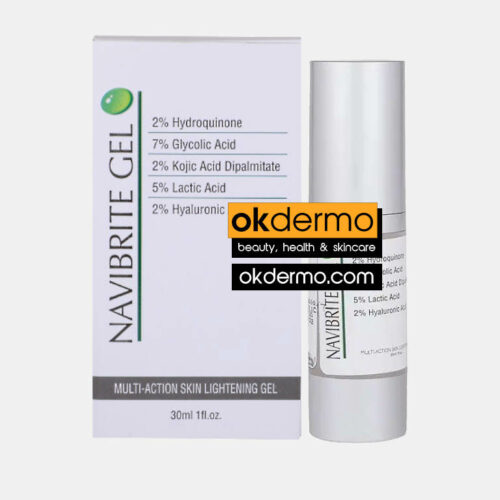
Navibrite® Multi-Action Skin Lightener
Hydroquinone 2% + Glycolic Acid 7% + Kojic Acid 2% + Lactic Acid 5% + Hyaluronic Acid 2%
Size: 30ml / 1 fl.oz
USD $46.00 Add to cart -
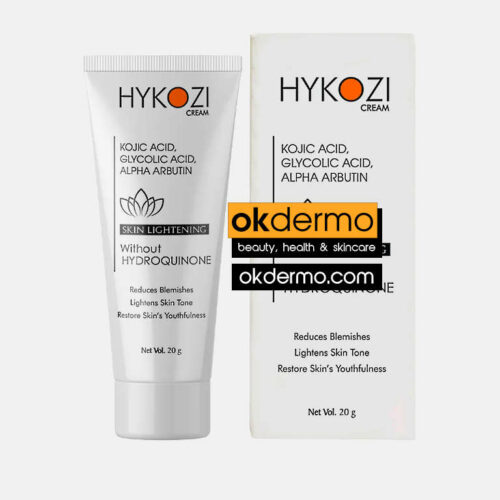
Hykozi® Non-Hydroquinone Skin Glow Cream
Kojic Acid 2% + Glycolic Acid 2% + Licorice 1% + Alpha Arbutin 1% + Lactic Acid 0.2%
Size: 20g / 0.7oz
USD $32.00 Add to cart
4 Best Alternatives to Hydroquinone Creams
Looking for some best alternatives to hydroquinone? Here is a list of some natural and highly effective products:
Kojic acid
Kojyl-APPA, a derivative of kojic acid has been used for many years as an effective skin whitening agent. It works by inhibiting the synthesis of melanin in the skin, hence improving the skin tone.
Retinoids
With potent anti-aging and skin-lightening properties, retinoids are one of the best alternatives to hydroquinone. Retinoids are used in multiple over-the-counter products for treating various skin conditions, such as acne, pigmentation, freckles, and dull skin texture.
Vitamin C
Vitamin C, also known as ascorbic acid, is a powerful antioxidant for improving skin health. Nowadays, it is extensively used in the skincare industry due to its skin-brightening and anti-aging properties. Moreover, vitamin C is excellent in promoting collagen production, thus providing elasticity and hydration to skin cells.
Azelaic acid
Azelaic acid serves as a gentle alternative to hydroquinone for the skin. It helps even skin tone, reducing dark spots and hyperpigmentation. This acid is suitable for various skin types and poses fewer risks, making it a reliable choice for those seeking an effective and mild solution for skin discoloration.
Is Hydroquinone Dermatologically Safe for All Skin Types?
Although hydroquinone is considered safe for topical application, however, there are a few exceptions. Therefore, it is always recommended to seek medical advice before making use of these products. For people having dry or sensitive skin type, hydroquinone use might worsen their condition.
Similarly, individuals with darker skin tones should consult their dermatologists, as hydroquinone can sometimes intensify hyperpigmentation issues. Furthermore, using these products in the long term may also stimulate such skin conditions.
Pros and Cons of Hydroquinone Cream
Although hydroquinone cream is dermatologically tested and approved for providing numerous skin benefits, there are still some disadvantages as well. Check out the list below to learn about common pros and cons of hydroquinone:
Pros
- Gentle to the skin
- Highly effective yet affordable
- Available at all medical stores
- Can be stored at room temperature
- Can be used for all skin types
Cons
- Must be extremely cautious in its dosage and application
- Improper application may cause redness and skin sensitivity
- Effects are temporary and can be reversed with high sun exposure
Contradictions to Hydroquinone Cream
Hydroquinone is generally considered safe by dermatologists with no specific limitations. However, in case you’re a pregnant lady or kid under 12 years of age, it is advisable to consult your skincare expert before using it.
Conclusion
While hydroquinone is effective for skin lightening and treating various concerns, its suitability varies. Seeking professional guidance and a doctor’s prescription is crucial for ensuring both safety and optimal skin improvement.
Frequently Asked Questions (FAQs)
- What happens when you stop using hydroquinone cream?
When you stop using hydroquinone cream, your skin may gradually return to its original condition. Hydroquinone inhibits melanin production, and discontinuing its use allows normal melanin synthesis to resume, particularly with exposure to sunlight. Therefore, ensure wearing sunscreen to maintain its effectiveness for a longer duration.
- What is the best way to stop using hydroquinone cream?
The best way to quit using hydroquinone is to reduce its dosage and frequency gradually. If you’re using it in the morning and evening, then use it once a day. After a few days, use the product on alternative days instead of using it every day. Eventually, discontinue its usage after consulting with your skin expert.
- Is hydroquinone a steroid?
No, hydroquinone is not a steroid. Instead, it is a skin-bleaching agent used in numerous skincare products to lighten the skin tone.
- Can I take hydroquinone orally?
No! According to recent studies, taking hydroquinone orally is toxic and may lead to exogenous ochronosis, resulting in pigmented spots on the skin.
- How long does it take to work?
Skin lightening with hydroquinone can be observed within a month. However, if you don’t see any visible improvement in 2-3 months, it is advised to seek consultation with your dermatologist.
- Can I use hydroquinone cream every day?
The usage frequency of hydroquinone cream depends on its concentration and formulation. Daily use is common for some formulations, but excessive and prolonged usage should be avoided to prevent potential side effects.
- Can I buy hydroquinone cream over the counter?
In 2006, The Food and Drug Administration proposed a ban on all over-the-counter hydroquinone products that was later approved in 2020 by the FDA’s drug review process. You can purchase online via OKDERMO.
- Can hydroquinone cream cause cancer?
The safety of hydroquinone is a subject of debate, but studies haven’t definitively linked it to cancer. However, prolonged and excessive use may lead to potential risks. Moreover, hydroquinone makes your skin more susceptible to ultraviolet radiation from the sun, posing an increased risk of skin cancer. So, it’s good to use it under professional guidance and use a high-quality sunscreen to avoid such concerns
Bibliography:
- Sarkar, R., Arora, P., Garg, K. V. (2013). “Cosmeceuticals for Hyperpigmentation: What is Available?” Journal of Cutaneous and Aesthetic Surgery, 6(1), 4–11. : https://www.ncbi.nlm.nih.gov/pmc/articles/PMC3663177/
- Maeda, K., Fukuda, M. (2017). “Arbutin: Mechanism of its Depigmenting Action in Human Melanocyte Culture.” Journal of Pharmacology and Experimental Therapeutics, 276(2), 765-769. : https://jpet.aspetjournals.org/content/276/2/765
- Halder, R. M., Richards, G. M. (2016). “Topical Agents Used in the Management of Hyperpigmentation.” Skin Therapy Letter, 6(4), 3-5. : https://pubmed.ncbi.nlm.nih.gov/11401225/
- Lee, P., Sun, J. (2019). “Hydroquinone.” In: StatPearls: https://www.ncbi.nlm.nih.gov/books/NBK557740/
Post by:
Marcella Jiovanni
Skin Care Professional
“Marcella Jiovanni actively promotes the importance of maintaining healthy skin, she envisions the future of dermatology as moving away from pure medical, pharmacological dermatology and flowing more toward a holistic approach to wellness and skincare.”

